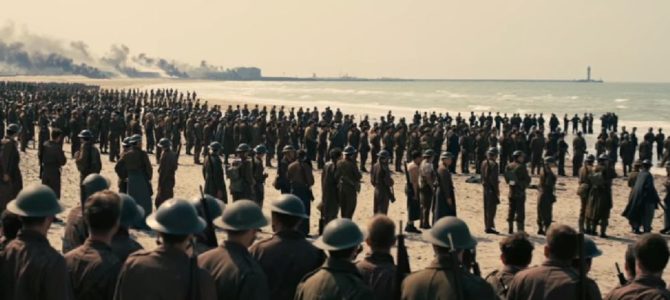
It’s pretty clear Marie Claire writer Mehera Bonner didn’t like Christopher Nolan’s “Dunkirk.” Her movie review for the magazine most women briefly glance at in the checkout line because it promises “30 days to a flatter stomach” called the World War II epic “basic,” and whined that if Nolan had any sense, he’d have made the film—about 400,000 Allied soldiers trapped on a French shore, surrounded by Nazi tanks—about women.
The “general vibe,” Bonner says, is just too male: “To me, Dunkirk felt like an excuse for men to celebrate maleness – which apparently, they don’t get to do enough of.” Women, she feminist-ingly implies, would never want to watch a gripping two-hour tale of everyday heroism amid the backdrop of a fight against looming totalitarianism.
Well, as a woman who pores over World War II books as a hobby and visits battlefields on vacation, let me just say that’s quite sexist. It’s such a bizarre sentiment, in fact, you could almost say it’s regressively misogynistic.
Stop Trivializing Women as Unserious Ninnyheads
I certainly don’t believe I’m the lone female in this world who likes a good war epic. The box office numbers and critical reception for “Dunkirk” bely a sort-of cross-genderism in its appeal. With few exceptions, top critics, both male and female, have found the movie gripping and masterful. Only the boring stalwarts of left-leaning pseudo-feminist “journalism” have been critical about the movie’s lack of sexual equality, and even then, they can barely hide their disdain for this historical accuracy their gender studies professors have told them is the result of pervasive “gender bias.”
Deeper than that, Bonner implies that women simply aren’t interested in war. That if women had the opportunity, they’d have solved Hitler’s hegemonic advance across Europe with a hug and a cup of tea, gently explaining to the wannabe dictator that his “toxic masculinity” could be cured by a quick dive into feminist poetry. Watching “men be men” in war just turns her off.
She even goes so far as to suggest Nolan make a war epic starring the women of World War II, if he wanted to stand out from the boring crowd, and spark the imaginations of the small but vocal women who only discovered comic book superheroes when someone made a big-budget movie about Wonder Woman. If you want women to like war, you have to make war about women!
Bonner would probably be disappointed in a movie about women in World War II, because, like with the millions of women who serve in the modern-day armed forces, most women who served their country in World War II understood that they were serving in a war. The Womens Airforce Service Pilots (the WASPs) and the Navy WAVES (Women Accepted for Volunteer Emergency Service) didn’t toil over maps of Europe discussing whether they could invite the Nazi soldiers to morning yoga. They flew service missions over Europe, towed massive artillery across oceans, and tended to the wounded just miles from the front lines.
Demeaning War Also Demeans Women’s Accomplishments
Field hospital nurses trained for the Normandy invasion alongside millions of their male colleagues in southern England before deploying into tenuously held French territory to tend to the thousands of wounded soldiers who washed ashore at Omaha and Utah beaches. Dozens of British women serving in Winston Churchill’s Special Operations Executive parachuted in behind enemy lines ahead of the Normandy invasion to foment resistance among the French living in coastal areas, and stayed on the ground as the Allied Expeditionary Force came ashore, working undercover to disrupt Nazi communications, and destroy Nazi supply lines.
Women in World War II were in a unique position to see the devastation that total war wrought on their countrymen, some of whom were as young as 15 years old, and they served anyway—because, like the few women who populate the rescue ships in “Dunkirk,” they understood that although men were fighting some of the bloodiest battles the world had ever known, the consequence of losing the fight against Nazism was dire. And totalitarianism doesn’t discriminate based on gender.
Ironically, though, many of these women have gone unheralded for decades, and not just because the armed services retain some vestiges of misogyny from an earlier time. Although feminists were busy trumpeting the invaluable contributions of the female sex during the women’s liberation movement, they deliberately left out women who served in war. After all, crusaders like Jane Fonda were adamantly anti-war, and women who served their country valiantly were complicit in America’s dastardly, imperialistic aggression against the far more preferable (in Fonda’s eyes, anyway) Communists.
All women suffered for it. It was the late 1990s before WASPs were given their due honor. It was the late 2000s before President Obama finally awarded World War II’s heroic women the medals they richly deserved. To celebrate the female contribution to World War II, then, Bonner and her ilk would have to accept that war isn’t simply a “male interest,” and in the mid-1940s, as America engaged in Total War, it wasn’t about “bro-ing out.” It was about defeating a pernicious enemy.









